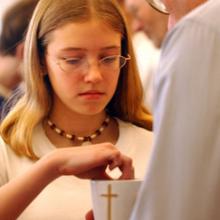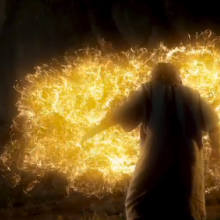Last Supper
IN 1633, THE Bavarian village of Oberammergau experienced a miracle. The villagers had promised God they would stage a reenactment of the passion of Christ if they were spared from the plague. They were spared. Nearly 400 years later, people continue to come from around the world to see these performances. But there’s a problem. Oberammergau’s passion play is one of the most antisemitic artworks in European history. Adolph Hitler viewed the play in 1930 and 1934 and recognized its propaganda value for his own plan of Jewish genocide.
Christians today may still perpetuate anti-Jewish racism throughout our passion narratives — particularly when the gospel of John forms the core of the lectionary. Unlike the others, John’s gospel frequently labels anyone opposing Christ as “the Jews.” Most of us realize that the writer is naming a subset of religious leaders. But when we repeat the phrase throughout Easter, we can subconsciously reproduce and amplify antisemitism found in the Christian theological imagination.
Recently, rather than ignoring the passion play’s antisemitism, the director worked with the American Jewish Committee to rid the play of anti-Jewish tropes. The 2022 Oberammergau passion play told a more complete Easter story. “The Jews” now include Jesus and his followers too. Jesus lifts a copy of the Torah to pray the Sh’ma Yisrael. Hebrew prayers were recited over the Last Supper. Mary is greeted as the “rabbi’s mother.” Significantly, the updated version calls Christians to repent for how we’ve failed our foundational sibling relationship.
2020 WAS A YEAR of ecological breakdown. Simultaneous climate disasters have roared, including the worst wildfire season in the history of California and, as I write this, the most active hurricane season on record in the Atlantic. Meanwhile, freak wind storms called derechos plagued the Midwest and heatwaves baked the Southwest. In the midst of such devastation, it can seem downright irresponsible to search for hope. Yet, the paradoxical call of the cross is that, in the deepest darkness, joyful and beautiful transformation might be possible.
In The Green Good News, T. Wilson Dickinson does not settle for platitudes of hope. He does not affirm, as is so tempting for Christians, that all will be fine because of faith in God. Instead, Dickinson finds good news in the possibility of a beautiful and joyful set of responses to ecological breakdown. With humble writing grounded in stories of his own life, Dickinson offers a reading of scripture that does not separate the liberation of creation from the liberation of the poor but follows the vision of Jesus, in whom all creation—human and more-than-human—holds together. In a refreshing move, The Green Good News sheds the romanticism of creation care in favor of a biblically based environmental justice from the margins. Dickinson unequivocally offers a call to conversion from neoliberalism to solidarity with all oppressed creatures. This ecological conversion takes place at the heart of the Christian witness: the table.

Image via RNS/Fibonacci Blue/flickr.com
The world seems to be witnessing increasing levels of violence, fear, and hatred that challenge us each day. There are ongoing debates about how or whether to welcome immigrants and refugees to the United States; news headlines remind us about the plight of Syria and about the horrors of the Islamic State.
In such times, talk about mercy may seem more like wishful thinking. But mercy matters – now more than ever.

Judas Iscariot. Engraving by Shyuble. Oleg Golovnev / Shutterstock.com
One of the many things that I love about being a progressive Christian is the frequent emphasis that Jesus is our brother. He’s one of us. He took on the fullness of humanity.
The joy and the hope and the friendship and the love.
But also the pain and the anger and the grief and the suffering.
Jesus, the One who was fully divine was fully human. Our brother. Our friend. It’s a beautiful thing.
Indeed, Jesus is our brother, but what about Judas? This Maundy Thursday, let us acknowledge that Judas is our brother, too.

Stained glass window depicting Jesus and the apostles at the Last Supper in the cathedral of Brussels. by jorisvo / Shutterstock.com
I am this broken and bleeding world.
I am Brussels, blown apart, the strewn limbs, the piercing wail of a mother for her baby.
I am Yemen, at the marketplace, charred bodies of children face-down in the dust.
I am Syria, families cramming into boats as guns and missiles chase them from the shore.
I am Afghanistan, Pakistan, Iraq, Libya, Somalia, pockmarked by bomb blasts, orphaned children hiding away from clear blue skies.
I am the growling of empty bellies drowned by the sound of gold pouring into the bottomless coffers of the war machines as they devour their sustenance and spit out death in return.
I am generation upon generation of silenced and vanished victim buried in the ground and trampled.
I am slain from the foundation of the world.
As online worship becomes more common in some churches, leaders within the United Methodist Church are debating whether the denomination should condone online Communion.
About 30 denominational leaders met last week after Central United Methodist Church in Concord, N.C., announced plans to launch an online campus that potentially would offer online Communion. Some nondenominational churches already offer online Communion, according to United Methodist News Service, but leaders urged the denomination’s bishops to call for a moratorium on the practice and do further study of online ministries.
The majority of the leaders agreed with the statement that Communion “entails the actual tactile sharing of bread and wine in a service that involves people corporeally together in the same place.” Not everyone, however, agreed that congregants must be in the same place.
The Bible. Just the phrase sends messages, signals, and feelings to our hearts and minds, and around the world. It’s the best-selling book in human history, and one that the majority of humanity (including me), believes to have been inspired by God, with myriad interpretations of what that means.
I grew up on Bible stories, some of the best stories in human and divine history. We learned them as kids, were amazed at the images and lessons, and they were ingrained into our thinking and acting. So I watched with great delight as my sons, Luke and Jack, saw the first episode of “The Bible,” a History Channel special series that began this past Sunday and runs the five weeks through Easter. Film and television personalities Mark Burnett and Roma Downey are behind this, with a legion of others. They expect it to eventually be seen by 1 billion people.
The first Sunday show was a very dramatic depiction of the creation story, Noah’s Ark, Abraham’s call to come out to a new land, the birth of Ishmael and Isaac, the almost sacrifice of Isaac, Hebrew slavery in Egypt, Moses' call at the burning bush, and the Exodus through the Red Sea — all in two hours! I loved watching my 9-year-old Jack watch the stories with such excitement. “I know this story!” he would say and tell us what was about to happen. “I don’t know this one,” he would then comment, and we would discuss it. We had a conversation about the scary sacrifice of Isaac before bedtime, trying to figure that one out. I told him I couldn’t have been as obedient as Abraham was.
Every three years, the assigned readings during the summer include five weeks of working our way through the Gopel of John, chapter 6, and what is called the "Bread of Life Discourse." And let’s just say that if Trey Parker and Matt Stone wrote a musical called The Book of John they’d have plenty of material from just this chapter alone.
In the last five weeks we’ve gone from the feeding of the 5,000 to Jesus walking on water in the middle of a storm at sea — by the way, Jesus walks on water during a storm at sea so often in the gospels that I’ve started thinking it was less about being miraculous and more about just getting in some cardio — anyhow, the crowd chased him down, demanding more bread, and then he goes and says that he is the Bread of Life come down from heaven (which angered the nice religious folks), and rather than backing off, he makes it even weirder by saying whoever eats his flesh and drinks his blood has eternal life.
Which is where we pick up today when some of his disciples are like, “Uh Jesus, that teaching is HARD…who can accept it?” And many of them leave. And I have to say, I don’t really blame them.
This teaching IS hard. But honestly, Jesus had a lot of sayings that were HARD. Sayings such as, " Love your enemies and pray for those who persecute you," "You who are without sin cast the first stone," "Sell all you have and give it to the poor," "The first shall be last and the last shall be first," and "If you seek to save your life you will lose it."
I totally understand the reaction of these disciples who say these teachings are hard, who can accept them?
But this week I started to wonder if maybe those disciples didn’t have to leave Jesus … I mean, when we make the accepting of hard teachings the litmus test for being a follower of Jesus, I wonder if we are perhaps missing the point altogether.




